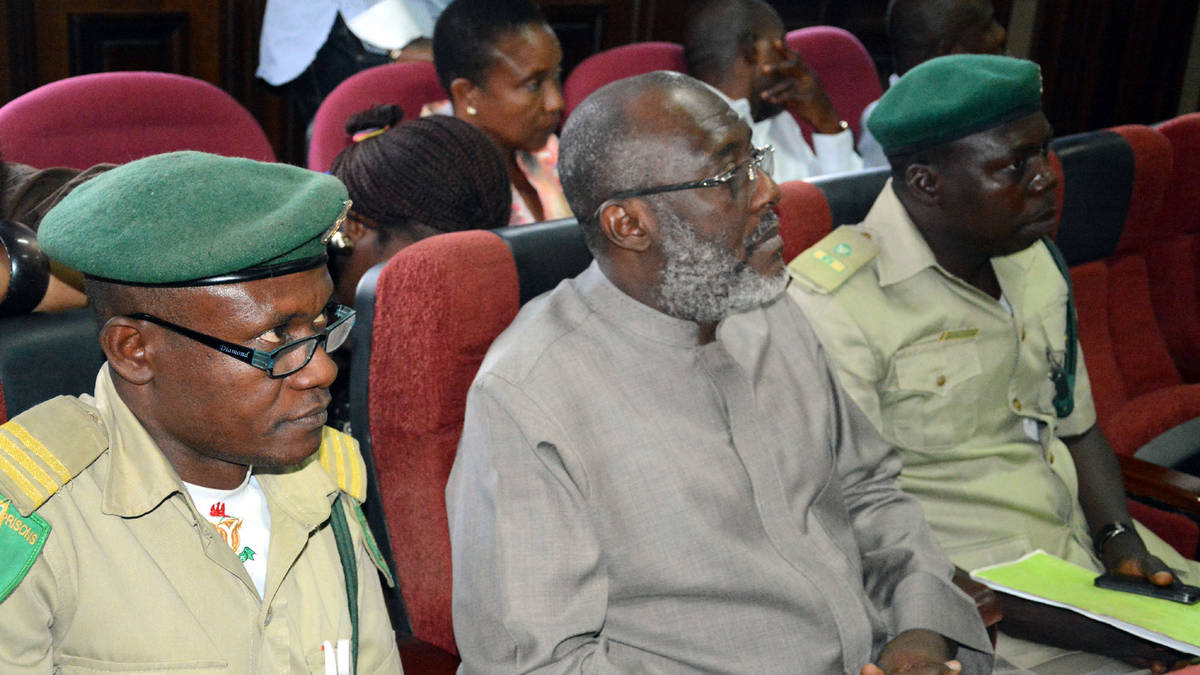An Abuja Division of the Federal High Court has adjourned ruling until Wednesday on an application by former National Security Adviser, Sambo Dasuki, to set aside a subpoena for his appearance in the court.
A former spokesperson of the Peoples Democratic Party, Olisah Metuh, obtained the subpoena from the court on Monday following an order of the Appeal Court on September 29.
Mr. Dasuki’s lawyer, Ahmed Raji, on Monday asked the court to set aside the subpoena saying it had not been served on his client.
Speaking during an interview with journalists after Monday’s hearing, Mr. Raji said his application was for the court to “set aside, or at the very worst put in abeyance, the order for the service of the subpoena’ until his client is released.
“We are asking it to set aside its subpoena, or at the very worst put it in abeyance, until the colonel is released. Because the subpoena is asking him to come and testify in a matter where there is a subtle indictment against him.
“It’s like asking him to come and testify against himself which is unconstitutional. So our stand is that the subpoena is not in order,” Mr. Raji said.
Speaking during the court session on Tuesday, Mr. Raji reiterated that his client’s decision to challenge the order was because the particulars of the charge against Mr. Metuh also indict his client, hence Mr. Dasuki should not be made to testify in the matter.
Reacting to Mr. Raji’s submission, Mr. Metuh’s lawyer, Onyeachi Ikpeazu, asked if the court had the right to overrule the subpoena.
Mr. Ikpeazu said the submission of Mr. Raji that his client was indicted in Mr. Metuh’s charge is an issue to be determined by the court.
Mr. Ikpeazu said the subpoena was made in good faith and that since Mr. Dasuki was not a party in the matter, there should be no need for the first defendant to antagonize the prospective witness by securing a warrant of arrest for Mr. Dasuki.
“That will be incongruous my Lord,” Mr. Ikpeazu said.
Similarly, the prosecution witness, Sylvanus Tahir, opposed the application on the grounds that the FHC, venue of Mr. Metuh’s trial was subordinate to the Appeal Court which had overruled a decision of the lower court against Mr. Dasuki’s subpoena.
Citing a ruling of the higher court to back his point, Mr. Tahir said any attempt by the lower court to counter the order of the Appeal Court amounts to an invitation to anarchy.
“The Federal High Court is a subordinate court to the Court of Appeal. Therefore a judicial action of the Court of Appeal cannot be subjected to a review by the FHC.
“Any attempt to do so would be contrary to the necessary intendment of the constitution and will cause judicial anarchy”.
Mr. Tahir said the order for the subpoena had not been appealed, therefore the former NSA could not bring his application to the court in session.
He further argued that since Mr. Dasuki was not a party in the matter, he could not appeal the case.
Responding, Mr. Raji said the subject of his application, which was the subpoena, did not emanate from the Appeal Court but from the lower court, hence the court in session had powers to set it aside or put it in abeyance.
He said the argument of the prosecution was inconsistent because the prosecution counsel, Mr. Tahir contended on one hand that Mr. Dasuki could not appeal the order, regarding the subpoena, since he was not a party in Mr. Metuh’s trial, and in another breath, he (Tahir) also said Mr. Dasuki had not challenged the order.
The presiding judge, Okon Abang, adjourned the trial for the second time in one week, at the instance of the defence, saying the matter would continue on Wednesday with the court deciding the application by Mr. Raji.
Mr. Abang also ruled that the adjournment on Tuesday was to allow both former President Goodluck Jonathan and Mr. Dasuki appear in court.
The application for Mr. Jonathan’s appearance was made orally on Monday. It was stated in court on Tuesday that the subpoena written after Monday’s session was yet to be served on the former President.
Speaking outside the courtroom, Mr. Raji told journalists that the subpoena was yet to be served on his client.
